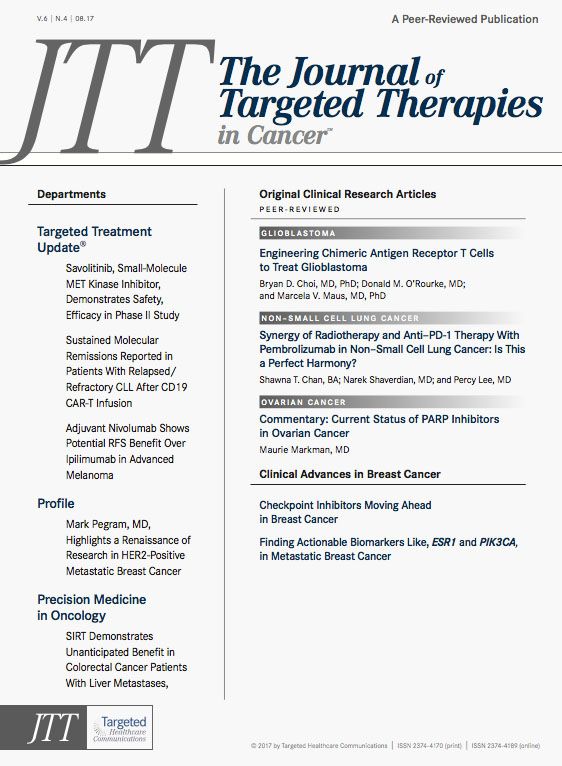Sustained Molecular Remissions Reported in Patients With Relapsed/Refractory CLL After CD19 CAR-T Infusion
About 71% of patients (17 of 24) with chronic lymphocytic leukemia exhibited an overall response (complete and/ or partial response) 4 weeks after receiving CAR T cell infusion therapy.
Cameron Turtle, MBBS, PhD
About 71% of patients (17 of 24) with chronic lymphocytic leukemia (CLL) exhibited an overall response (complete and/ or partial response) 4 weeks after receiving chimeric antigen receptor (CAR) T cell infusion therapy. The patients received chemotherapy and anti-CD19 CAR T cells at 1 of 3 dose levels (2 x 105, 2 x 106, or 2 x 107 CAR T cells/kg). Nineteen patients experienced disease progression while receiving ibrutinib, 3 were ibrutinib-intolerant, and 2 did not experience progression while receiving ibrutinib. In addition, 6 patients were venetoclax-refractory, and 23 had a complex karyotype and/ or 17p deletion.
Historically, the overall response rate for CLL has been low, and survival of patients who experienced progression while receiving ibrutinib is short; in addition, median overall survival is only 3 months.
Researchers at the Fred Hutchinson Cancer Research Center in Seattle reported a high rate of elimination of CLL from marrow and lymph node response after patients received CAR-T therapy. The findings suggest that measuring genetic traces of cancer cells taken from bone marrow biopsies might be a better indicator of prognosis than the standard lymph-node scan.
“It was not known whether CAR T cells could be used to treat these high-risk CLL patients,” lead author Cameron Turtle, MBBS, PhD, attending physician, Fred Hutchinson Bone Marrow Transplant Program, said in a statement. “Our study shows that CD19 CAR T cells are a highly promising treatment for CLL patients who have failed ibrutinib.”
The study expands on the measures used to indicate whether the CAR T-cell treatment is working. Researchers analyzed samples taken from some of the patients’ bone marrow 4 weeks after the CAR T-cell infusion. The team used immunoglobulin heavy chain deep sequencing, which is akin to a bar code and enables researchers to track cancer cells in the body.
The researchers performed the analysis in 12 of the patients. Seven of the 12 patients had no malignant copies. All patients without malignant copies were alive and free of disease at a median follow-up of 6.6 months after CAR T-cell infusion.
The 24 patients participating in the study ranged in age from 40 to 73 years, with a median age of 61 years. They had received a median of 5 other therapies, with as few as 3 and as many as 9.
The researchers reported that 83% of patients experienced cytokine release syndrome (grade 1-2, 18 patients; grade 4, 1 patient; grade 5, 1 patient) and 8 patients (33%) developed neurotoxicity (grade 3, 5 patients; grade 5, 1 patient). For the most part, the adverse effects (AEs) were reversible, but 2 patients had AEs severe enough to require being admitted to the intensive care unit, and 1 of those patients died.
Reference:
Turtle CJ, Hay KA, Hanafi L-A, et al. Durable molecular remissions in chronic lymphocytic leukemia treated with CD19-specific chimeric antigen receptor-modified T cells after failure of ibrutinib. [Epub ahead of print] J Clin Oncol. 2017; doi: 10.1200/ JCO.2017.72.8519.

Biomarker Testing Paves the Way for Better Targeted Therapies in NSCLC
April 16th 2024At a live virtual event, Edward S. Kim, MD, MBA, discussed the evolving landscape of biomarker testing before making treatment decisions for patients with early-stage non–small cell lung cancer (NSCLC).
Read More
Considering the Durability of Zanubrutinib in Relapsed/Refractory CLL
April 11th 2024During a Case-Based Roundtable® event, Marc S. Hoffmann, MD, discussed his viewpoints on the use of Bruton tyrosine kinase inhibitors for patients with relapsed/refractory chronic lymphocytic leukemia and the efficacy behind zanubrutinib in the second article of a 2-part series.
Read More
Acalabrutinib/Obinutuzumab Shows Improved PFS in Treatment-Naive CLL
April 10th 2024In an interview with Targeted Oncology, Jeff Sharman, MD, discussed the results of the ELEVATE-TN trial of acalabrutinib with or without obinutuzumab at 74.5 months of follow-up among patients with chronic lymphocytic leukemia.
Read More